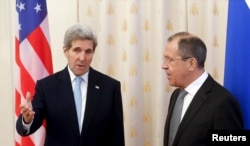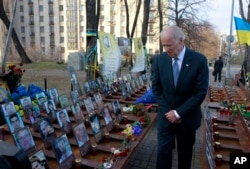The United States and Russia appear to have bridged some of their differences on war-ravaged Syria, with Moscow endorsing a plan for a third round of talks in New York this Friday to discuss a political transition.
Russia announced its support for the plan late Tuesday after U.S. Secretary of State John Kerry met with Russian President Vladimir Putin and Foreign Minister Sergei Lavrov in Moscow.
“While we don’t see eye to eye on every aspect of Syria, we see Syria fundamentally similarly,” said Kerry. He said the U.S. and Russia identify the same challenges and dangers, and want the same outcome.
Lavrov said Moscow and Washington agreed to intensify counterterrorism efforts, coordinate more closely on military activity and continue work on listing terrorist organizations in Syria.
Lavrov said that after the talks take place in New York on Friday, the International Syria Support Group, or ISSG, hopes to submit a draft resolution to the U.N. with provisions for a transition in Syria.
Transition plan
In mid-November, the ISSG held a second round of talks in Vienna and agreed on a broad plan for the transition. Representatives of Syrian opposition groups also held similar talks last week in Riyadh.
The ISSG agreed to try to bring Syrian and government opposition representatives into U.N.-mediated talks by January. It also voiced support for a cease-fire and the establishment of credible, inclusive governance within six months and free and fair elections within 18 months.
Kerry said the ISSG and the moderate Syrian opposition were in agreement that this does not mean that Syrian President Bashar al-Assad has to step down at the beginning of the process. It remains unclear if Syrian President Bashar al-Assad will cooperate with the plan.
Kerry traveled to Moscow from Paris, where he took part in a French-led ministerial meeting on Syria and the Islamic State group.
Relationship strains
A U.S.-led coalition and Russia have launched airstrikes against militant targets in Syria, but the United States has repeatedly criticized Russian efforts, saying most of its strikes have targeted the Syrian opposition rather than Islamic State extremists.
In a sign that U.S.-Russia relations remain strained over airstrikes in Syria, a Russian Foreign Ministry spokesperson said Tuesday U.S. "surgical" strikes against Islamic State should not boil down to "plastic surgery," which only masks the problem without solving it.
"We need to be smart, targeting ISIL, surgically, with precision," U.S. President Barack Obama had said Monday, using another acronym for Islamic State.
The Russian Foreign Ministry's comments in advance of the Kerry visit were measured.
"The situation surrounding the Russian-American relationship remains complicated," the Ministry said. "Russia has consistently pointed to the need to observe the principles of equality, mutual respect, and non-interference."
No deals on Ukraine
Kerry and Russian officials also discussed the situation in Ukraine. Both sides affirmed a commitment to the Minsk agreement which calls for a cease-fire between Ukraine and Russian-backed separatists.
Kerry said the U.S. and EU would consider rolling back sanctions on Russia once the agreement is fully implemented.
As Kerry and Russian officials discussed the situation in Ukraine, the State Department released an updated travel warning for portions of that country. It urged U.S. citizens to "defer" travel to two eastern regions of the country and Crimea, which Russia annexed last year. The United States does not recognize the annexation.
"Russia-backed separatists continue to control areas in the Donetsk and Luhansk oblasts," the warning said, "where violent clashes have resulted in over 9,000 deaths."
Moscow was the last stop of a tour for Kerry that included talks in Rome on a U.N. effort to unite Libya's fractured government.








